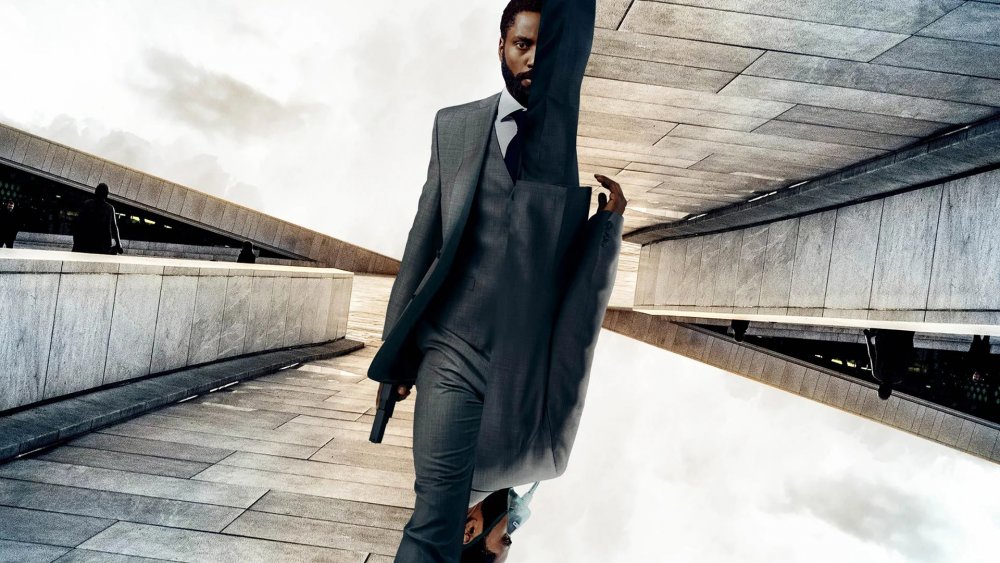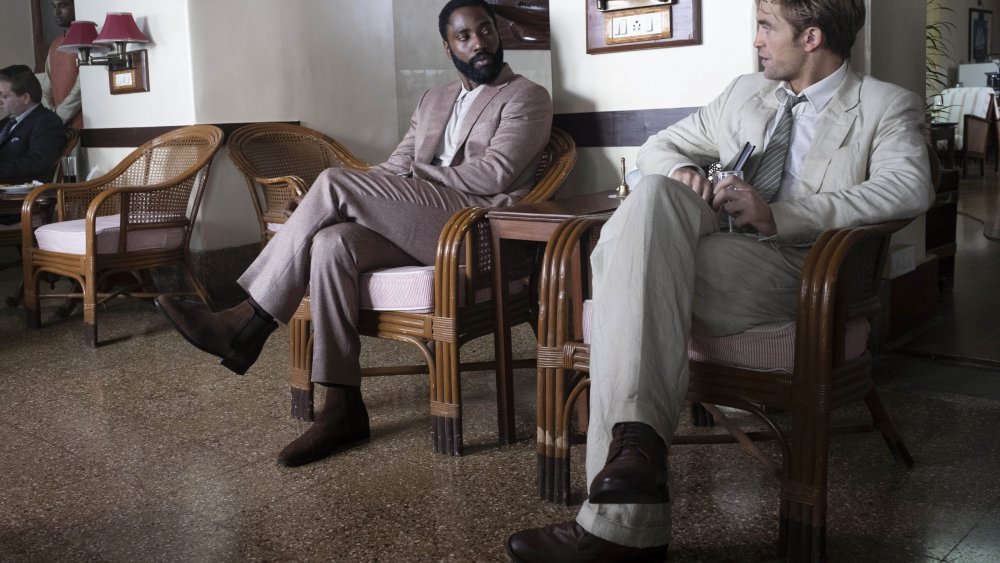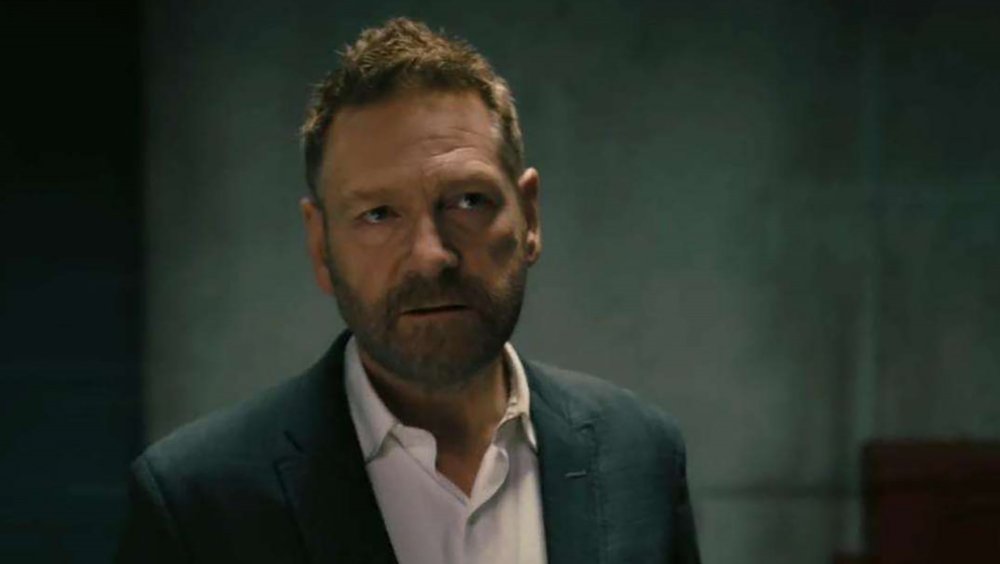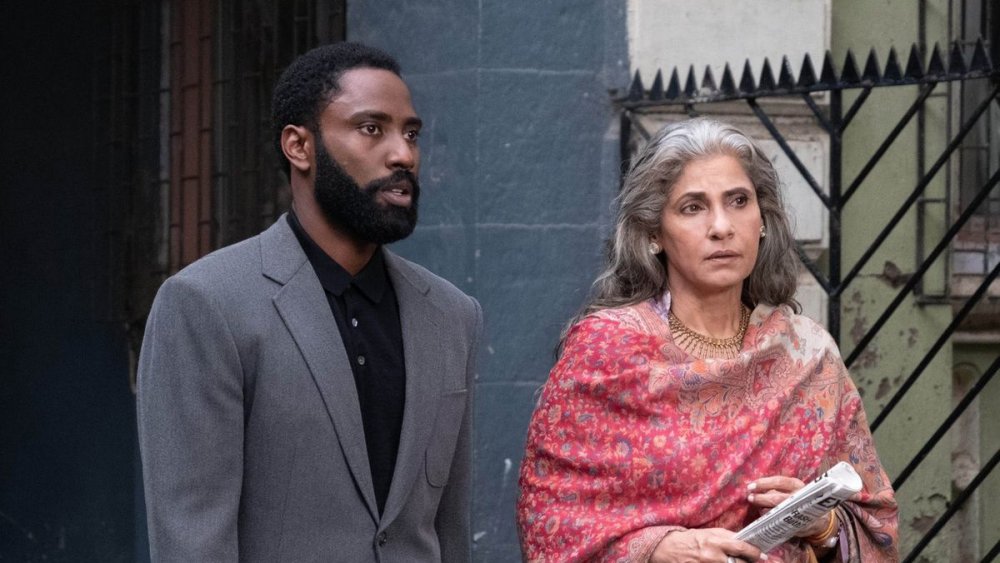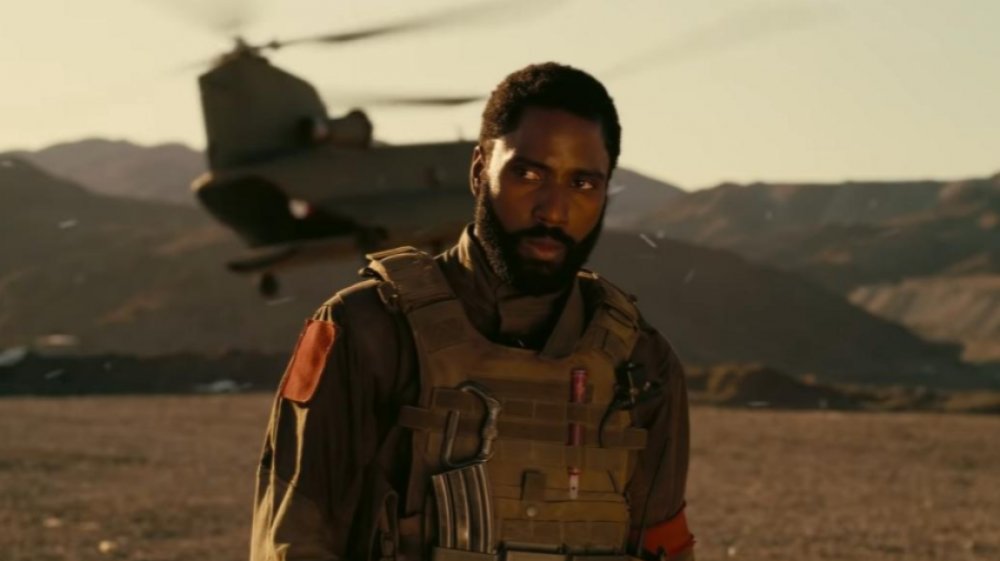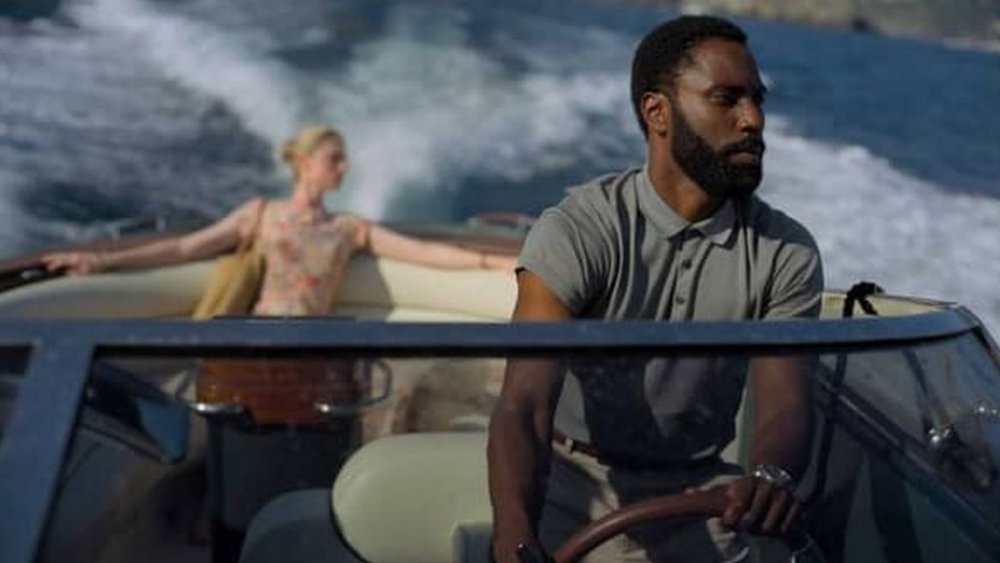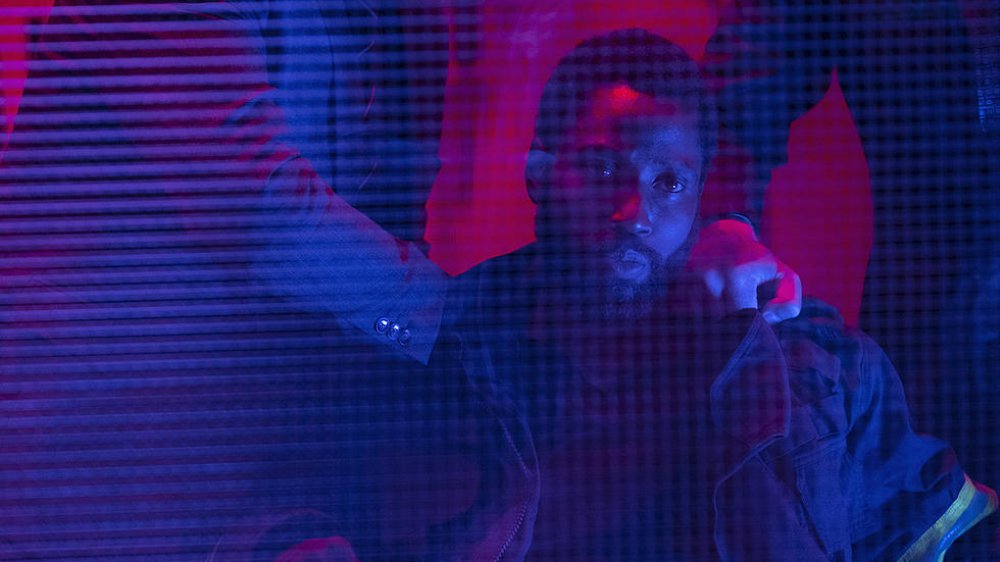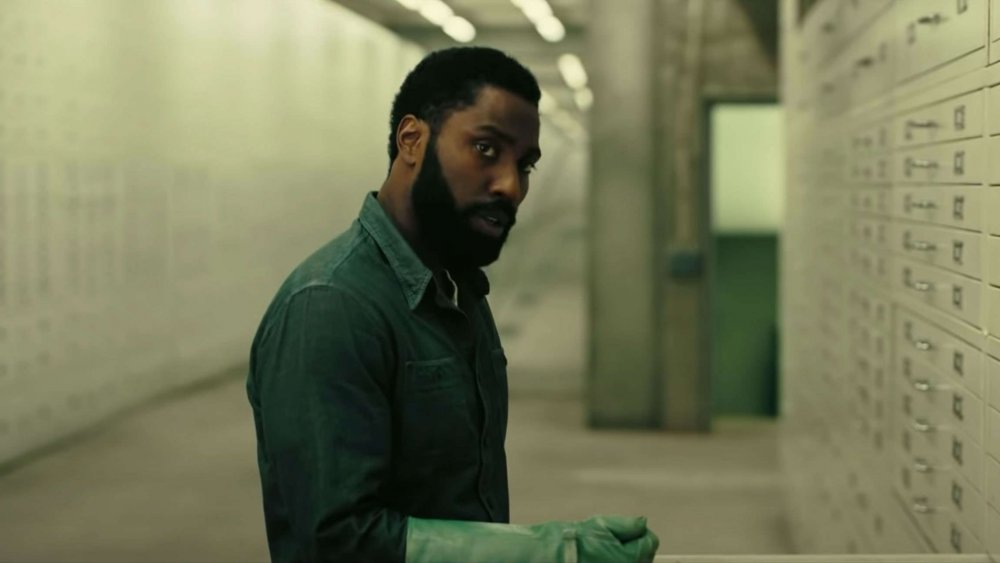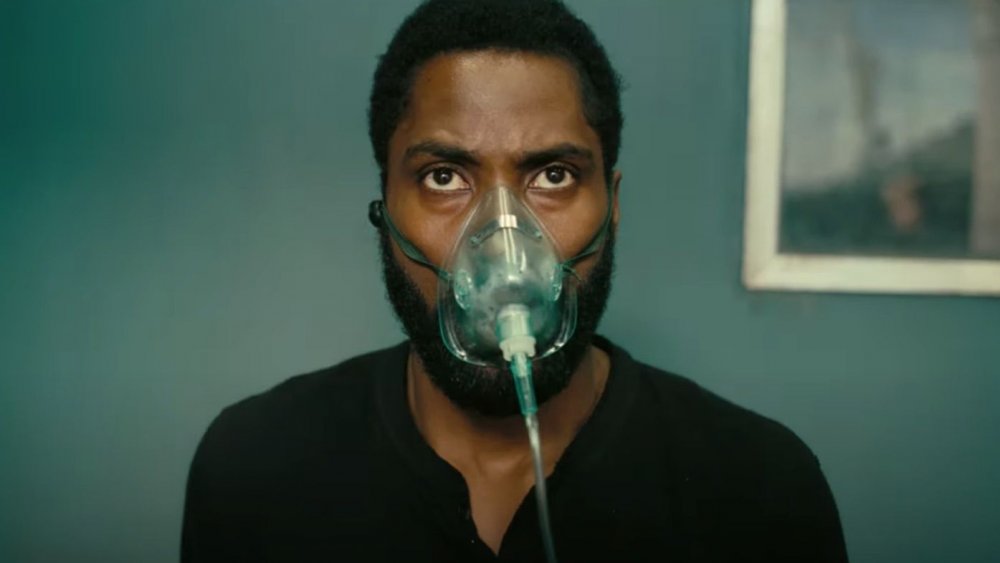Biggest Unanswered Questions In Tenet
Tenet takes the Tolkien-esque concept of "there and back again" to a whole new definition. There and back, then and now, before and after — it all becomes relative, but it's maintained tightly enough to remain consistent within its own universe to tell its story. This is a Christopher Nolan picture, however, which means the story is layered, complex, and often uses visual cues as exposition. It benefits from multiple viewings, looking for the little details that are the director's passionate flourishes. To a certain extent, you aren't supposed to get everything on the first pass, no matter how sharp-eyed you are and how well you can turn the movie's ideas around in your head as you watch it. There's no need to rush or treat the movie as a puzzle to solve — Tenet is an adventure and experience. Like Laura (Clémence Poésy) tells the Protagonist (John David Washington) as she explains inversion to him: you gotta do it by feel.
Nolan is also a man who seems to be motivated by asking questions he doesn't intend to answer, perhaps because he wants to leave the idea up to the audience to make their own interpretations — or because he wrestles with questions of living fragile, mortal lives in an universe we don't fully understand, questions that are actually un-answerable. It isn't necessarily a flaw, then, if these ideas aren't fully thought through onscreen — it's just part of the director asking us to question ourselves and our own reality as a philosophical exercise. Here are the biggest questions Tenet left hanging without definitive answers — and what we can try and parse from those non-answers, understanding Christopher Nolan and his creative approach the way we do.
Other-Neil
The climax of the film is a complicated combat operation during which two teams move in on the city where Andrei Sator (Kenneth Branagh) grew up to secure the Algorithm. Neil (Robert Pattinson) is part of the team that is inverted for the operation, while the Protagonist is not, but as the operation begins to fall apart due to countermeasures presented by the enemy, Neil breaks off from the team to work on his own, which ends in him using a Humvee to haul the Protagonist, Ives (Aaron Taylor-Johnson), and the Algorithm out of the pit before it can be buried by the explosion Sator has arranged to keep the Algorithm out of everyone's hands, and he can follow through on his suicidal mission to destroy spacetime.
We see that Neil is above ground throughout the entire scenario, but the red string and washer he keeps attached to his kit reveals a twist: Neil is also underground, masked in a balaclava and seemingly dead when the Protagonist is trying to get through a locked door. His body, obviously inverted in time, springs to life and saves the Protagonist's life as well as opens the door for him at exactly the right time — but if Neil has to get the Humvee up above, too, that means that there are two Neils operating simultaneously and arrived from different timelines. When did that happen, and how? The death is inverted, too, so is it permanent at some other point in the future? We can certainly respect Neil's dedication to the cause and his buddy the Protagonist, but a little bit of a hint as to how Neil swings that after getting on the helicarrier would provide a little bit of closure.
Who was Sator talking to?
This is the true biggie: who on multiple possible parallel future Earths was Andrei Sator getting his intel and technology from? It could be the Protagonist in a future we don't see; it's the first natural assumption to make, since he's directly or indirectly responsible for a whole lot of what happens in the movie's story, but if he were responsible for stringing Sator along as a very, very long con, it seems like an awfully risky double/triple/infinite-cross to secure the Algorithm. It also runs contrary to his established morals of empathy and having an interest in keeping the Algorithm in separate pieces, not together. The movie still needs that antagonist, so it's probably not the Protagonist, y'know?
It feels more likely to us that it's people somewhere, some time that Priya (Dimple Kapadia) makes mention of: parties interested in assembling the Algorithm contrary to Tenet's objectives. They could be one person, but it's more likely many, and it's entirely possible they are all operating semi-simultaneously on different iterations of the timeline. Tenet ends by thwarting Sator, who believes the world is doomed to a climate disaster because the future told him that was what would be — implying that by winning, the good guys have changed "what could have been," to borrow the Protagonist's words. The end result is something new, then, though that will likely present threats of its own. It's also impossible to know if thwarting Sator's plan changes the future enough to stop those specific but mysterious parties that reached out to him in the first place. They may be able to do it again, somewhere and some-when else.
Priya
Priya's a heck of a conundrum. Her character is extremely important, as she establishes the contrasting interests in pursuing the Algorithm. She is ultimately an antagonist, but she thinks she is operating in conjunction with Tenet's ideals. The Protagonist even includes her in his revelation he realized that everyone is working for him, somewhere in the future. If that's the case, then her purpose as a temporal chess piece appears to be as a vector of deliberately incorrect information — maybe. Tenet's true purpose is to find people who would gather the Algorithm, rather than keep it separated. How could Priya end up being wrong about that ideal, when she spends most of the movie in a place of relative status and knowledge? Was that the effort of people acting against the Protagonist, or the downstream effect of something the future Protagonist created himself? How many people like her are out there, aware of the collective of people Tenet represents, but not allied, knowingly or not, with the Protagonist — and which ones are inevitabilities of fate and which are created by the Protagonist?
None of these questions can be answered without knowing where Priya came from and how (in detail) she came to learn about Tenet, either. The husband she uses as an avatar for her business as an arms dealer clearly doesn't know what Tenet is, since the Protagonist is very careful to only use the hand sign and word in a clandestine way, and Priya talks to him about it with the husband well out of earshot. How did she swing that one?
The Protagonist's original job and code phrase
The Protagonist is chosen to learn about Tenet because of an operation in his previous job, which was operating as a CIA splinter cell to rescue a spy whose identity had been revealed from the Kiev operahouse. He makes contact with people using an oddly floral couplet: "we live in a twilight world / and there are no friends at dawn." This is an identifier he also uses to get in touch with his ex-boss to request local help in Mumbai, which is what brings Neil into the mix. Its purpose as a security measure is understandable enough, but decades of spy movies have taught us that these kinds of things should be more casual, like some insubstantial conversation that wouldn't stand out in a crowd. Perhaps it's just Nolan's sense of mythology, but it definitely makes the Protagonist's methods stand out from his cinematic spy peers. He has interesting ability gaps for a spy, too; we also see the Protagonist pretty much fail completely at a James Bond-esque seduction and intel gathering plot in the dinner with Kat, and not just because her husband knew the whole thing was coming, either. Is this not something he's done before, ever, in the CIA? One can be more naturally inclined to combat, but surely you've had to do some clandestine schmoozing before, buddy.
This naturally brings us to ask exactly what the Protagonist's previous and complete job description was, and what his life was like before basically dying (insofar as the paperwork is concerned) and entering the world of Tenet. It isn't necessary to the plot, strictly speaking, so much as it is an interest in learning more about the Protagonist and the team he lost.
The Protagonist's recruitment through his boss
If we dig further into this whole code word situation, we also have to ask about the whole Mr.-CIA-Boss-to-the-Protagonist-recruiting-him-for-Tenet thing. The Boss, Victor (Martin Donovan), describes the Kiev operation as "a test," implying this was always the plan for him (and it was, but in a different sense), but later on in explaining Tenet to the Protagonist, he doesn't know a whole lot and seems to conceive of the Protagonist's objective as a shadow op on behalf of the intelligence organization to learn more. How can Victor test the Protagonist for entry to a collective that he doesn't understand? When the Protagonist calls him in Mumbai, however, he refers to him as though he's no longer beholden to the CIA, and the Protagonist treats the relationship the same way, asking for a favor from "old allies." How did Victor learn about any of this, if he simultaneously is aware of Tenet and yet is requesting someone else go out on missions to learn more, and with an authority separate from the CIA at that?
Now, because of the ending, we can appreciate well enough that the future Protagonist is essentially recruiting himself through a proxy (and that's really all that matters for the story), but what was Victor's place in that long, long chain of events? According to the general conceit of inversion and how Tenet actually works as revealed by the ending, cluing the Protagonist in on Tenet is an end result that we don't see the process of. All we can know is through his most important action: telling the Protagonist that he qualifies to learn about Tenet because of his sense of self-sacrifice, so we know he is aligned with the good guys that utilize Tenet's collective knowledge. Basically, we don't quite understand where he truly came from, and he would have to have had some kind of journey himself to learn about Tenet at all that we never see.
Did what happened happen, or is it un-happened
The Grandfather Paradox — the question of whether, if you killed your grandfather before you're born, you destroy your own timeline and kill yourself — is kicked around in philosophical discussion multiple times throughout Tenet, and at the end of all things in this complex temporal labyrinth, it's worth asking again: did all of what happened happen, once they're all done? Like, overall. It happened to some of them, sure, but does it all still exist in the collective world? Neil's ultimate answer to the Protagonist when he asks about the paradox is a big fat "I dunno," and that's probably the authorial intent of the question. We can't know, and we won't.
Metaphysics aside, Kat has a scar no matter what, Sator ends up dead according to the thread of his own life (in that particular reality, at least), and the items drifting back through time are still doing so exactly as introduced in the moment they are seen in the movie. These things must occur for the ending to happen, after all. It's heavily implied that the Protagonist and his allies will have to continue performing missions like this in their lives, relative past and present alike, to maintain the series of events as we see them in Tenet to keep them true for themselves. It must continue happening, constantly, lest some misstep mean it does, indeed, become un-happened. Or something.
Our brains hurt, too. It's okay.
Where and when did this begin
We've asked if what happened happened, but on the other side of that coin is asking when and where this began. Who found the first piece coming back through time? How long has that been happening? How did the past learn to measure the quality of something that hadn't been invented yet? That last question can probably be answered by acquiring technology Sator received from the past, but the fact remains: how did anybody outside of Sator ever collect enough of this together in the beginning to understand what was going on? When the Protagonist has inversion explained to him by Laura, they are in a massive warehouse with thousands and thousands of doors; either they've been collecting this stuff for a very long time, or a very large amount of stuff arrived all at once to tip off somebody (possibly the CIA?). It's not totally unreasonable to suspect a sequel or prequel could cover this, if Nolan wanted to make one, but without that, there's really no way to know who discovered what, when, and where. If you go further and ask yourself whether the Protagonist's efforts made the beginning change or un-happen, well... see above, and make the best guess you can.
The Algorithm's fate, especially for Neil
The big, weird-looking stick that represents math: that's what the Algorithm is, but its fate is somewhat murky when you stop to consider the totality of the situation. Tenet ends with a pretty unambiguously happy ending, and that can only be accomplished by successfully secreting the pieces of the Algorithm away like Horcruxes between the Protagonist, Neil, and Ives, who each got three parts. Where, exactly, would that be? People who know of Tenet are everywhere (at all points in time, too, as far as well can tell), and they aren't necessarily aligned with the heroes' belief that the pieces should be kept apart.
It's a tall order all on its own, made more complicated by knowing Neil eventually dies in a way we don't see in the Soviet city they just claimed the Algorithm from. Did Neil get a chance to hide all three of his pieces before he goes back to put himself there? Or is his place there, making sure he's on the other side of that locked gate to save the Protagonist at just the right second, meant to make up for a mistake on his part? It doesn't even necessarily have to be one of Neil's pieces that is discovered.
Tenet, as the Protagonist intends to use it, is a very elaborate game of keep-away with the Algorithm. It's heavily implied that the good ending we see is something that has to be actively maintained through time by the Protagonist and his allies. After all, the Algorithm's creator (who also is a big unanswered question herself) originally hid the pieces, and that clearly didn't do any permanent good. The conflict of the day, encapsulated in Sator's suicide mission, is over, but the greater conflict isn't.
